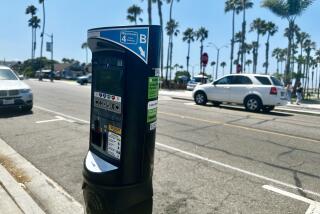How to use quick response codes
- Share via
The futuristic square bar codes, commonly known as quick response, or QR, codes, are sprouting up everywhere — on billboards, in store displays, on packaging and in newspaper and magazine ads.
Invented in Japan in 1994, the technology has recently gained traction among U.S. retailers and other companies as an innovative way to reach consumers. Once scanned with a smartphone or tablet camera, the codes prompt your device to open a Web page, play a video or even place a call.
Target Corp., Macy’s Inc., Best Buy Co., Starbucks Corp. and Home Depot Inc. are just a few of the companies putting QRs in ads or in stores. Leading code maker Scanbuy, which tracks figures for QR code scans, said the number had shot up more than 1,600% in the last year and a half to about 2 million a month.
But many ads with QRs have little or no explanation of how to scan them or how the codes work.
So what do you do when you see one of these newfangled squares that appear to be a cross between abstract art and Rorschach tests?
First, you need to have a smartphone or tablet equipped with a camera. It also has to have a code-reading app.
Newer models of Android and BlackBerry phones come with an app pre-installed. IPhone, iPad and other smartphone and tablet owners can download one of the many apps available free at the Apple App Store, the Android Market, BlackBerry App World or other app stores online.
To scan, simply open the app and hold your device’s camera up to the QR code. Keep your hand steady and try to center the image of the QR code on your phone or tablet screen. Once the camera locks onto the QR, the Web page, video or other data linked to the QR should automatically open up.
To make your own QR, go to one of the many websites that generate free codes. Input whatever information you would like the QR to link to — it can be a URL, a text message or a phone number — and the site will make a QR. The code will look like a square with artsy, pixilated splotches of black and white.
Hip and tech-savvy people have gotten creative about how to use QRs and where to put them. Some stamp one on business cards or at the end of emails, which are often linked to a Facebook page, contact information or resume. Others have knitted sweaters with a working QR code stitched in. Still others get QRs tattooed onto their bodies.
More to Read
Inside the business of entertainment
The Wide Shot brings you news, analysis and insights on everything from streaming wars to production — and what it all means for the future.
You may occasionally receive promotional content from the Los Angeles Times.











